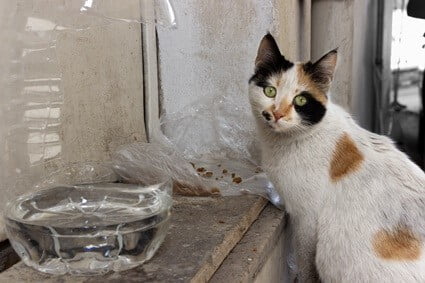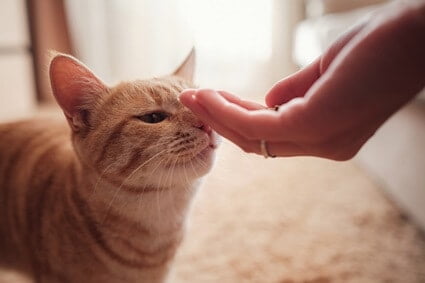Some cats regularly visit their neighbor’s homes in search of extra food or a tastier meal. While most cats enjoy being fed twice, it’s not good for their weight and health. If your neighbor also provides companionship that your cat’s not getting at home because you’re too busy, it may move in permanently.
It’s not illegal for neighbors to feed another person’s cat, so you’ll need to politely ask your neighbor to stop. When doing so, highlight how harmful it is for your cat’s health to overeat and how its new routine affects your lifestyle and family. If your neighbor refuses to stop, you’ll need to keep your cat indoors.
Although people do steal cats, your neighbor likely means no harm. They could be lonely or may mistakenly believe that the cat is a stray. All the same, you’re responsible for your cat’s well-being, including its dietary needs.
How Do I Know if Someone Else Is Feeding My Cat?
Any changes to your cat’s behavior or demeanor indicate that it’s getting food elsewhere, but the most noticeable sign is that your cat doesn’t appear hungry when it returns home.
Check for these signs:
- Weight gain
- Disappears for extended periods of time
- Suddenly develops an upset stomach
- More distant and standoffish
- Develops allergies it’s never had before
- Smells of unfamiliar aftershave or perfume
Is It Illegal To Feed Someone Else’s Cat?
There are no laws that prevent neighbors from feeding other people’s cats or laws that specify that cats can’t enter into other people’s property. This would result in a floodgate effect of cases.
However, there are examples of owners successfully suing their neighbors for feeding and adopting their cats. This means neighbors could be liable if they feed and adopt cats they know already have a home.
Why Do Cats Visit Other People’s Homes?
Even if you provide your cat with a warm, loving home with plenty of food, there are reasons why a cat may visit another home to eat. If it’s allowed to continue, the cat may choose the neighbor’s home as its new home, so understanding why your cat goes elsewhere is essential.
These are the most likely reasons:
Greed
Some cats are naturally greedy and want to eat all the time. If you keep to a strict feeding schedule, your cat will attempt to get food elsewhere. Unfortunately, this can cause various problems.
Greedy cats are at risk of obesity. As described by the Journal of Feline Medicine and Surgery, this means they’re more likely to develop diabetes.
However, food obsession is also a sign of several health problems, including:
- Parasites
- Hyperthyroidism
- Eating disorder
- Nutritional deficiencies
Get your cat checked out by your vet to rule out any health problems that could be contributing to its excessive food consumption. If you can resolve the cause, your cat may no longer seek food elsewhere.
Tastier Food
Your neighbor might be offering your cat its favorite food, which means your cat will want to go there to eat. Unfortunately, delicious food doesn’t always equate to healthier or better quality food.
Food Anxiety
If you have multiple cats, your feline could have food anxiety. Cats in this situation either eat too quickly or don’t eat at all. This is why they feel more comfortable eating at a neighbor’s house. Other stressors at mealtimes include:
- Cold draughts
- Excessive heat
- Strange smells
- Food too close to the litter tray
- Territory claimed by humans and other animals
Loneliness
Many cats enjoy company before or after eating. Similarly, some cats like to be petted while they eat. This is known as attention eating. It’s sometimes brought on because of a traumatic experience or illness, which gives cats comfort and reassurance while enjoying their meal.
If you’re not around while your cat eats, your cat may become stressed and unhappy. Consequently, it will go elsewhere to find the company it craves.
Peace And Quiet
Some cats prefer to eat when it’s calm and quiet. If you run a busy household with children or lots of noise, your cat might feel too anxious to eat. That’s why your cat might eat elsewhere. The simplest solution is to move your cat’s food and water bowl to the quietest place in the house and let it eat without any disruption.
How To Stop Someone Else Feeding My Cat
It can be frustrating when a neighbor regularly feeds your cat. Felines are creatures of routine, and once a cat falls into a pattern of behavior, it will regularly follow it. Whatever the reason, you’ll need to put a stop to this day-to-day routine. If your cat eats twice, it will start to gain weight.
Your first step should be a polite conversation with your neighbor. Ask them to stop feeding your cat because it’s on a special diet due to a health problem. Most people will immediately stop feeding another cat when asked to do so.
If your neighbor refuses to comply, you will need to keep your cat indoors. Your cat will not take kindly to this at first, so you’ll need to ensure that your home and food meet all of your cat’s needs. You’ll need to do the following:

Have A Neighborly Chat
Before doing anything else, check that your neighbor knows that the cat belongs to you as they may believe it to be a stray. In this instance, they’re simply doing what they think is a good deed.
Similarly, ensure that your neighbor is wilfully feeding your cat. If the home has a resident feline, the issue may not be as clear-cut as you think. Your cat may be gaining access through a window or cat flap and eating the other cat’s food without your neighbor even knowing.
If your neighbor does not have a cat, explain that you are concerned about your cat’s welfare. Point out that your cat is gaining weight, and this is placing its health at risk. Any right-thinking neighbor will immediately cease feeding.
Explain Your Cat’s Routine
All cats need routine and stability. Most cats will build their schedule around feeding times. Play, food, grooming, and sleep is the pattern of behavior for most domesticated cats.
If you work all day, your cat will learn your rhythms and expect food at certain times. This helps an otherwise nocturnal cat adhere to human hours. A well-timed dinner will see a cat sleep through the night, not disturbing an owner.
If the cat is eating earlier, this whole routine can be thrown off-course. The cat will not be hungry when you expect it to be, and it may not eat at all at night. What’s more, it will enjoy a long doze after eating. It will wake up filled with vigor.
If the cat ate and slept early in the evening, it would be a ball of energy overnight. The likelihood is the cat will race around like a maniac. This sounds fun, but it’s infuriating when you’re trying to sleep. Despite being silent hunters, cats can make unholy amounts of noise when they’re not trying to catch prey.
Explain that your cat is keeping you up at night due to its changed routine. Use the analogy of playing loud music through a wall at night, if necessary. Most people will understand and stop feeding your cat.
Use an emotional hook. Explain that your children return from school upset that they cannot play with their cat. It is busy eating with the neighbor or sleeping off its meal. By the time the cat wakes up, the children are in bed.
Point Out Health Concerns
Discuss the obvious health concerns related to cats eating to excess. Cats need to follow a strict caloric intake to remain healthy. For the average cat, this is around 200 calories per day. Your neighbor may be offering fatty treats. Compendium on Continuing Education for the Practicing Veterinarian explores the risk of high-fat foods.
Also, your neighbor may not understand feline nutrition. For example, many people offer cats tinned tuna. Most cats love the smell and taste of this tinned fish. Unfortunately, what cats like is not always what is best for them.
Acta Neuropathologica explains that the mercury found in tuna has a detrimental impact on feline health. Mercury poisoning leads to muscle wastage and loss of coordination. A saucer of milk can be equally problematic. Cats love dairy as it is fatty, but dairy may cause a stomach upset as most cats are lactose intolerant.
Special Diet
If your cat needs a carefully balanced diet because of an ongoing health condition, explain to your neighbor that eating an inappropriate diet can make it sick or even reduce its life expectancy.
Some neighbors may remain belligerent in the face of these claims. If the response is, “the cat likes what I feed it,” bring up stomach upsets. Again, this will likely be grounded in reality.
Cats experience gastric distress from eating too much or varying food. Faced with the risk of the cat soling their favorite rug, many neighbors will change their tune.
Leave A Letter
If you’re unsure which neighbor your cat’s visiting and you can’t have these conversations with them in person, place a thin, laminated paper collar on your cat with a note explaining the situation. Write down your number and ask the neighbor to give you a call so that you can talk about the next best steps calmly.
Admit Defeat
You may decide to allow your neighbor to feed your cat, which is a decision that does have its advantages. Your cat will have company when you are out, and you’ll have a pet sitter when you take a vacation.
You may be doing a good turn, especially if your neighbor is elderly or physically or mentally unwell. The Handbook on Animal-Assisted Therapy confirms that animal companionship has a positive impact on seniors’ mental health.
If your cat has a specific medical condition, give your neighbor a bag or a couple of pouches so that they can feed it the same food as you. If there’s no way to stop your neighbor from feeding your cat, this is the only safe option. Your neighbor may even be willing to contribute to the cost.
However, it is better to find a way to keep your neighbor from feeding your cat without harming interpersonal relations. Admitting defeat could be the first step to unwittingly rehoming your cat, so it’s not a decision you should take lightly or be pressured into.
How To Stop Your Cat Going To Your Neighbour’s House For Food
If your communicative efforts don’t work with your neighbor, you’ll need to find a way to stop your cat from visiting them altogether. This is unlikely to be an easy process, and your cat won’t like it, but it might be the only way to prevent your cat from going to your neighbor’s house for food. To do this, follow these steps:
Keep Your Cat Indoors
Hopefully, you won’t have to keep your cat indoors forever, but you will need to prevent outdoor access while working on the triggers that cause your cat to go elsewhere for food.
Free-roaming cats will need a longer period of adjustment. You’ll also need to make it clear that your cat’s not being punished by providing treats and affection. Also, don’t get angry at your cat if it scratches at the door to get outside.
If possible, create a catio in your yard, allowing your cat to get some fresh air and exercise in a safe, enclosed space. This’ll prevent the cat from running away.

Improve Your Cat’s Diet
If your cat’s going to your neighbor’s house for food, there’s every chance it’s unhappy with the food you give it. Unfortunately, if your cat’s on a strict prescription diet, there’s little you can do about this, as you can’t take it off its medical food plan. You could try making its food more tempting by adding small quantities of meat stock to its meals.
For all other cats, try to find out what your neighbor was feeding yours. You may need to change to this food. It could be more expensive, but cats are stubborn creatures. If you want your cat to eat with you at home, it’ll need this food.
Adjust The Routine
Your cat has grown accustomed to visiting a neighbor for a meal, so it needs to know that this is no longer acceptable. Cats are adaptable as long as you remain consistent.
Feed your cat at the same time every day. Tie the food in with other pleasurable activities, such as petting, grooming, and play. Make sure it has somewhere quiet to eat so that it doesn’t develop food anxiety. That way, your cat will soon readjust to its new life.
Provide Companionship
Time alone can be hard for a cat to readjust to. Ask a friend or neighbor to visit your cat when it would ordinarily roam. Cats do not need attention all day, every day. However, knowing that somebody will visit can brighten a cat’s day.
Get Your Cat Microchipped
While a microchip won’t stop your cat from going to your neighbor’s house for food, it proves ownership. This makes it difficult for your neighbor to argue against who the cat rightfully belongs to.
If a neighbor has started to feed your cat, you should have a friendly conversation about the problem. The neighbor may be acting with good intentions and may not know that it has a home. If they refuse to comply, you’ll need to keep your cat away from their home. This issue is a civil disagreement, and the law will not help in this instance.


Probably the best article i have read about this problem. Thank you xx